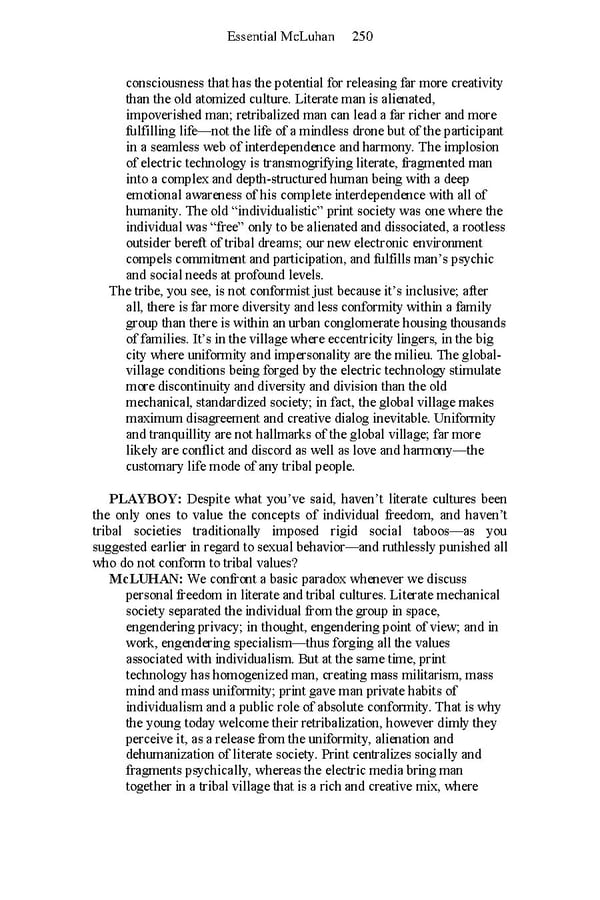Essential McLuhan 250 consciousness that has the potential for releasing far more creativity than the old atomized culture. Literate man is alienated, impoverished man; retribalized man can lead a far richer and more fulfilling life—not the life of a mindless drone but of the participant in a seamless web of interdependence and harmony. The implosion of electric technology is transmogrifying literate, fragmented man into a complex and depth-structured human being with a deep emotional awareness of his complete interdependence with all of humanity. The old “individualistic” print society was one where the individual was “free” only to be alienated and dissociated, a rootless outsider bereft of tribal dreams; our new electronic environment compels commitment and participation, and fulfills man’s psychic and social needs at profound levels. The tribe, you see, is not conformist just because it’s inclusive; after all, there is far more diversity and less conformity within a family group than there is within an urban conglomerate housing thousands of families. It’s in the village where eccentricity lingers, in the big city where uniformity and impersonality are the milieu. The global- village conditions being forged by the electric technology stimulate more discontinuity and diversity and division than the old mechanical, standardized society; in fact, the global village makes maximum disagreement and creative dialog inevitable. Uniformity and tranquillity are not hallmarks of the global village; far more likely are conflict and discord as well as love and harmony—the customary life mode of any tribal people. PLAYBOY: Despite what you’ve said, haven’t literate cultures been the only ones to value the concepts of individual freedom, and haven’t tribal societies traditionally imposed rigid social taboos—as you suggested earlier in regard to sexual behavior—and ruthlessly punished all who do not conform to tribal values? McLUHAN: We confront a basic paradox whenever we discuss personal freedom in literate and tribal cultures. Literate mechanical society separated the individual from the group in space, engendering privacy; in thought, engendering point of view; and in work, engendering specialism—thus forging all the values associated with individualism. But at the same time, print technology has homogenized man, creating mass militarism, mass mind and mass uniformity; print gave man private habits of individualism and a public role of absolute conformity. That is why the young today welcome their retribalization, however dimly they perceive it, as a release from the uniformity, alienation and dehumanization of literate society. Print centralizes socially and fragments psychically, whereas the electric media bring man together in a tribal village that is a rich and creative mix, where
 Essential McLuhan Page 256 Page 258
Essential McLuhan Page 256 Page 258